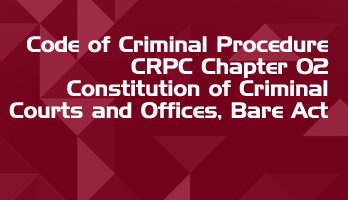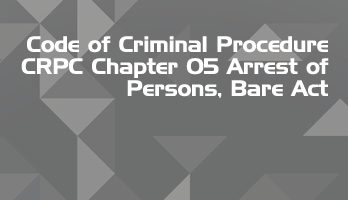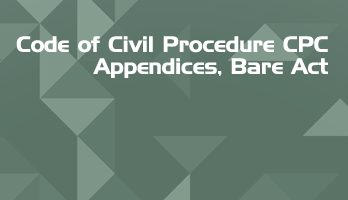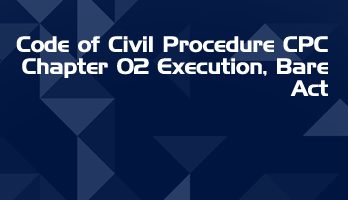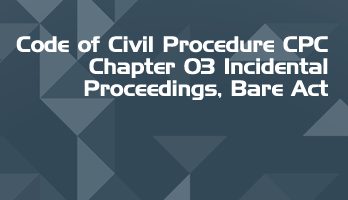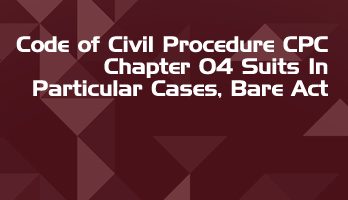A 'Bare act' is the actual legislation passed by the Parliament of India. Generally, an act sets out the high level legal and policy principles applicable to the subject matter of the law.
Most acts are accompanied by 'subsidiary legislation' such as rules, regulations, notifications and orders; which address the actual implementation detail of the act.
Free Full Course Available on LawMint's YouTube Channel
How to Land Your Dream LLB Internship in a Top Law Firm
- Part 1 - Introduction
- Part 2 - Internship Planning
- Part 3 - Internship Research
- Part 4 - Building Your Profile
- Part 5 - The Email
- Part 6 - The Resume
- Part 7 - The Cover Letter
- Part 8 - The Interview
- Part 9 - Self Development
Practical and comprehensive course, with real examples and step-by-step analysis of the complete internship application process. Check out LawMint's YouTube channel now!
Code of Criminal Procedure, 1973
Chapter 3 – Power Of Courts
Section 26 – Courts by which offences are triable
Subject to the other provisions of this Code, –
- any offence under the Indian Penal Code (45 of 1860) may be tried by –
- the High Court, or
- the Court of Session, or
- any other Court by which such offence is shown in the First Schedule to be triable; Provided that any offence under section 376, section 376A, section 376AB, section 376B, section 376C, section 376D, section 376DA, section 376DB or section 376E of the Indian Penal Code shall be tried as far as practicable by a Court presided over by a woman.
- any offence under any other law shall, when any Court is mentioned in this behalf in such law, be tried by such Court and when no Court is so mentioned, may be tried by. –
- the High Court, or
- any other Court by which such offence is shown in the First Schedule to be triable.
1 Criminal Law (Amendment) Act, 2013
2 Criminal Law (Amendment) Act, 2018
Section 27 – Jurisdiction in the case of juveniles
Any offence not punishable with death or imprisonment for life, committed by any person who at the date when he appears or is brought before the Court is under the age of sixteen years, may be tried by the Court of a Chief Judicial Magistrate, or by any Court specially empowered under the Children Act, 1960 (60 of 1960), or any other law for the time being in force providing for the treatment, training and rehabilitation of youthful offenders.
Section 28 – Sentences which High Courts and Sessions Judges may pass
- A High Court may pass any sentence authorised by law.
- A Sessions Judge or Additional Sessions Judge may pass any sentence authorised by law; but any sentence of death passed by any such Judge shall be subject to confirmation by the High Court.
- An Assistant Sessions Judge may pass any sentence authorised by law except a sentence of death or of imprisonment for life or of imprisonment for a term exceeding ten years.
Section 29 – Sentences which Magistrates may pass
- The Court of a Chief Judicial Magistrate may pass any sentence authorised by law except a sentence of death or of imprisonment for life or of imprisonment for a term exceeding seven years.
- The Court of a Magistrate of the first class may pass a sentence of imprisonment for a term not exceeding three years, or of fine not exceeding ten thousand rupees, or both.
- The Court of a Magistrate of the second class may pass a sentence of imprisonment for a term not exceeding one year, or of fine not exceeding five thousand rupees, or of both.
- The Court of a Chief Metropolitan Magistrate shall have the powers of the Court of a Chief Judicial Magistrate and that of a Metropolitan Magistrate, the powers of the Court of a Magistrate of the first class.
Section 30 – Sentence of imprisonment in default of fine
- The Court of a Magistrate may award such term of imprisonment in default of payment of fine as is authorised by law: Provided that the term –
- is not in excess of the powers of the Magistrate under section 29;
- shall not, where imprisonment has been awarded as part of the substantive sentence, exceed one – fourth of the term of imprisonment which the Magistrate is competent to inflict as punishment for the offence otherwise than as imprisonment in default of payment of the fine.
- The imprisonment awarded under this section may be in addition to a substantive sentence of imprisonment for the maximum term awardable by the Magistrate under section 29.
Section 31 – Sentence in cases of conviction of several offences at one trial
- When a person is convicted at one trial of two or more offences, the Court may, subject to the provisions of section 71 of the Indian Penal Code (45 of 1860), sentence him for such offences, to the several punishments, prescribed therefore which such Court is competent to inflict; such punishments when consisting of imprisonment to commence the one after the expiration of the other in such order as the Court may direct, unless the Court directs that such punishments shall run concurrently.
- In the case of consecutive sentences, it shall not be necessary for the Court by reason only of the aggregate punishment for the several offences being in excess of the punishment which it is competent to inflict on conviction of a single offence, to send the offender for trial before a higher Court: Provided that –
- in no case shall such person be sentenced to imprisonment for a longer period than fourteen years;
- the aggregate punishment shall not exceed twice the amount of punishment which the Court is competent to inflict for a single offence.
- For the purpose of appeal by a convicted person, the aggregate of the consecutive sentences passed against him under this section shall be deemed to be a single sentence.
Section 32 – Mode of conferring powers
- In conferring powers under this Code, the High Courts or the State Government, as the case may be, may, by order, empower persons specially by name or in virtue of their offices or classes of officials generally by their official titles.
- Every such order shall take effect from the date on which it is communicated to the person so empowered.
Section 33 – Powers of officers appointed
Whenever any person holding an office in the service of Government who has been invested by the High Court or the State Government with any powers under this Code throughout any local area is appointed to an equal or higher office of the same nature, within a like local area under the same State Government, he shall, unless the High Court or the State Government, as the case may be, otherwise directs, or has otherwise directed, exercise the same powers in the local area in which he is so appointed.
Section 34 – Withdrawal of powers
- The High Court or the state Government, as the case may be, may withdraw all or any of the powers conferred by it under this Code on any person or by any officer subordinate to it.
- Any powers conferred by the Chief Judicial Magistrate or by the District Magistrate may be withdrawn by the respective Magistrate by whom such powers were conferred.
Section 35 – Powers of Judges and Magistrates exercisable by their successors – in – office
- Subject to the other provisions of this Code, the powers and duties of a Judge or Magistrate may be exercised or performed by his successor – in – office.
- When there is any doubt as to who is the successor – in – office of any Additional or Assistant Sessions Judge, the Sessions Judge shall determine by order in writing the Judge who shall, for the purposes of this Code or of any proceeding or order thereunder, be deemed to be the successor – in – office of such Additional or Assistant Sessions Judge.
- When there is any doubt as to who is the successor – in – office of any Magistrate, the Chief Judicial Magistrate, or the District Magistrate, as the case may be, shall determine by order in writing the Magistrate who shall, for the purposes of this Code or of any proceedings or order thereunder, be deemed to be the successor – in – office of such Magistrate.
Important Central Acts in Regional Languages
Legislative department website also features regional language versions of several important Central Acts.
Free Full Course Available on LawMint's YouTube Channel
How to Land Your Dream LLB Internship in a Top Law Firm
- Part 1 - Introduction
- Part 2 - Internship Planning
- Part 3 - Internship Research
- Part 4 - Building Your Profile
- Part 5 - The Email
- Part 6 - The Resume
- Part 7 - The Cover Letter
- Part 8 - The Interview
- Part 9 - Self Development
Practical and comprehensive course, with real examples and step-by-step analysis of the complete internship application process. Check out LawMint's YouTube channel now!





